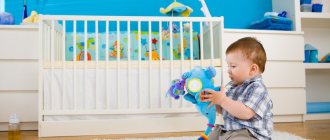- April 21, 2019
- Children 1-3 years old
- Svetlana Funtova
Kindergarten is the first serious stage on a child’s path to growing up. Despite numerous debates about whether it is worth sending your child to a preschool institution, it is impossible to dispute the benefits that the child receives. Often, working parents simply have no other choice, while others, on the contrary, are confident in the importance of this stage in the life of a little person. Nevertheless, both of them have a question about what age to send their child to kindergarten.
Suitable age
At what age to send a child to kindergarten is first decided at a family council. As a rule, children are brought to preschool at 1-3 years of age, much less often at an older age. Most kindergartens have introduced an informal age limit for children up to one and a half years old. If parents have doubts about the age at which children are sent to kindergarten, they should consult with specialists and educators.
According to psychologists, the optimal age to start attending kindergarten is from 2.5 to 3 years. Children at this age speak quite well and perceive the authority of an adult. Therefore, their adaptation is faster.
Documents for enrollment
As a rule, first you need to get on the waiting list - to do this, just submit an application to the desired nursery and wait for a vacant place. Next, parents are notified of their child’s enrollment, which is the basis for completing the necessary documentation. As a rule, the main securities include:
- Passport of one of the parents, as well as its copy;
- The baby's birth certificate, as well as its copy;
- Certificate of residence (parent-applicant and child).
On a note! The list of documents may differ in each institution and for each family, due to the individual characteristics of the child or the charter of the institution. Above are the papers that are required everywhere.
The most suitable option for parents who are in a hurry to go to work is a private nursery. Enrolling a child and completing documentation takes place very quickly, sometimes even in one day. The documents required from parents are registered on the nursery’s website or by the institution’s employee himself.
Thus, the age at which children are taken to nurseries varies depending on the institution itself, but, as a rule, a single figure is set - 1.5 years. Parents can send their child to a municipal nursery or to a private organization, which differ in cost, conditions and time for enrollment.
Where to start preparing for the garden
If parents experience anxiety and fear about their child going to kindergarten for the first time, it is necessary to get rid of them, since they are passed on to the baby. If the baby feels that his parents are absolutely calm when he is in kindergarten and are confident in his safety, it will be easier for him to overcome the period of adaptation at a new stage of life for him.
To prevent your child from encountering additional difficulties in kindergarten, it is important to instill in him some independence skills.
It is necessary to prepare a child for kindergarten in the following areas:
- The baby must be able to walk and ask to go potty. It is necessary to wean him off diapers long before visiting kindergarten. You can bring the potty from home to make your baby feel more comfortable.
- Ability to use cutlery and eat properly. If before this the baby had to eat chopped food, whole pieces should be gradually introduced into the diet.
- Skills in putting on and taking off clothing and shoes. It is recommended to purchase wardrobe items without complex fasteners and laces.
Among other things, it is important to gradually accustom the child to the kindergarten daily routine: early rise, walks, quiet time, etc. This should be done gradually so as not to expose the little person to stress. You can take a walk from time to time to the location of the proposed kindergarten and watch how the children are having fun playing. This way the child will perceive this place as familiar, and perhaps he himself will want to take part in the kids’ games.
Psychological preparation of children and parents
When parents have decided what time to send their child to kindergarten, they need to prepare him and get ready for the upcoming changes in the family’s life.
First of all, you need to start by changing the daily routine: it should exactly correspond to the kindergarten one. You need to have breakfast, lunch and afternoon snacks at the same times as in preschool. Daytime sleep should last as long as quiet time in kindergarten. As a result, adaptation will be easier, since for the baby it will be a familiar regime, simply transferred to another territory. If parents do not know what age to send their child to kindergarten, then it is worth talking with the teacher or head. Typically, the optimal age is 3 years.
Parents need to be patient and allow the child to be independent. Even if this takes a lot of time at first, the baby must learn to take care of himself: putting on and taking off clothes and shoes, washing his hands, etc. No matter how good the kindergarten is, teachers are sometimes physically unable to pay maximum attention to each child.
Speech is of great importance. It is clear that in kindergarten classes, special attention is paid to the development of the child’s speech abilities. At the same time, he must be able to communicate with other children and tell the teacher about his needs.
In addition, parents are recommended to visit places where children gather, such as playgrounds, sports complexes, and parks, with their children as often as possible. This way, the baby will have the opportunity to communicate with peers, and he will quickly get used to being in a group.
In the first couple of months, the adaptation period is especially acute, and the child will need to be taken to kindergarten for a short period of time, and not for the full day. In some cases, the reaction to the new environment is manifested by frequent illnesses, therefore, if the mother is on maternity leave, it is recommended to send the child to kindergarten at least 2 months before the planned return to work.
Types of nurseries and enrollment conditions
There are two types of nurseries: private and public. The latter are the most popular, since the cost in these institutions is much lower than in private ones.
Before the actual registration of the baby, it is necessary to determine the purpose of this process. In cases where parents want to send their child to a nursery so that he develops and communicates with other children, while at the same time returning to work, they can choose a state nursery. The only disadvantage of this type of institution is the long queues. There are often situations when the family gets their turn, but their child no longer needs a nursery.
In private nurseries, the main advantage is the availability of free places and, accordingly, the ability to accept children at any time convenient for parents. However, the monthly cost may be too high for a particular family; in Moscow it reaches 30 thousand rubles. As a rule, children from one year old are taken to such nurseries. Small groups are formed so that teachers can devote enough time to each child.
An individual approach is selected for each child, which undoubtedly has another advantage.
Adaptation
It is immediately worth noting that there are no children who do not go through an adaptation period. And it doesn’t matter how old the child is. Adaptation takes place both in the nursery group and in preschoolers. This is a completely new stage in a child’s life, which he experiences psychologically and emotionally. Starting with new food, ending with strangers to him. The baby’s immunity is faced with viruses that are new to him, which is why the incidence of illness increases until specific antibodies are formed in the body.
It is impossible to say how long the child’s adaptation will last; it all depends on him. For some, this is a couple of weeks, others may refuse to go to kindergarten until graduation.
Tearfulness, hysteria and illness
The most common psychological problems characteristic of a child who comes to the younger group are tearfulness and hysterics. There is no need to inflate the problem and classify the child as “non-kindergarten”. Only a pediatrician can prescribe sedatives, and only if they are necessary. Parents need to independently find an approach to the baby. The best tactics will be kindness and understanding. Under no circumstances should you scold or force a child, this will only worsen the situation.
As already mentioned, while at home, children are much less likely to encounter viral and infectious diseases than in kindergarten, but there is a downside. Everyone knows: there are many diseases that are best dealt with in childhood, since they can be very dangerous for adults. The immune system, overcoming pathogens that are new to it, becomes stronger. You can reduce the risk of colds, especially during the adaptation period, if you start visiting the kindergarten in the warm season.
Possible problems
Such a significant change in a child’s life as kindergarten can lead to a number of problems, both psychological and medical. However, Komarovsky advises preparing for them in advance. Best of all, from birth.
Accustoming a child to new conditions, according to Komarovsky, is a purely individual process. One child will quickly accept the new “conditions of the game”, while another will resist change a little longer. These are mainly psychological problems, although sometimes, against the backdrop of internal rejection of new conditions, the baby can become quite physically ill. This connection in medicine is called psychosomatics.
Tearfulness and hysterics
These are the most common manifestations of psychological problems that any child who is sent to kindergarten has. In this situation, Komarovsky recommends not “making a mountain out of a molehill” and not registering the child as sick. Sedatives and sedatives are needed only for those children who are very sensitive to new things in their lives, and if children's doctors - a psychiatrist and a neurologist believe that there really is such a need.
In the next issue, the famous pediatrician Dr. Komarovsky will talk about how to wean a child from hysterics.
Frequent illnesses
Evgeny Komarovsky considers this natural. Frequent illnesses are mainly caused by viruses, and the likelihood of “catching” them is higher if the child’s social circle is wider. Of course, staying at home, the baby has less chance of getting the flu or flu, although it does not tend to zero, because the “infection” can be brought by parents from the street or guests. But you can’t keep a child at home all his life!
In addition, there are a number of diseases that are best dealt with in childhood, since they are incredibly dangerous for adults. These are the familiar chickenpox and rubella.
Dr. Komarovsky will talk about the prevention of childhood diseases in kindergarten.
According to Evgeniy Komarovsky, what deserves special attention is not the fact and frequency of diseases “brought” from the kindergarten, but the severity of these ailments. One baby is sick quite mildly for five days, the other lies in bed for two weeks, and then the parents spend another month recovering from the consequences of complications. This is in no way the preschool's fault. This is a feature of the immunity of each individual baby, as well as the specifics of its treatment.
Frequent illnesses of a kindergarten child should not be attributed to teachers who dressed the child incorrectly for a walk, did not tie a scarf, or forgot about the hat. In this way, parents conveniently mask their own inadequacy, says Komarovsky. First, they create greenhouse conditions for the baby, which actually “cripple” his immunity, and then they complain that, having encountered rain or a draft in the kindergarten, their baby got sick. The absence of such greenhouse conditions, the correct and adequate attitude of parents towards the child from birth practically eliminates such “accidental” diseases in kindergarten.
What kind of child is “non-kindergartener”?
A child is called a non-sadikovsky when the period of his adaptation is prolonged, however, according to Dr. Komarovsky, such a concept simply should not exist. If you provide the right conditions in the group, encourage visiting the kindergarten and make it interesting, the child will be happy to go there.
It’s another matter if the child suffers from diseases that make attending preschool impossible. If parents manage to find a kindergarten where the staff has medical skills, then children with developmental disabilities may well attend it. In this case, the answer to the question of when is the best time to send your child to kindergarten should be found out from your pediatrician. Since the development of special children differs from the general mass, only a doctor can suggest nuances about the child’s readiness to visit society.
Tips for parents
When parents have found out what age to send their child to kindergarten and have decided on a preschool institution, they can be given the following recommendations:
- If parents are persistent and consistent in their actions, the child will realize that kindergarten is a reality that he will have to come to terms with.
- Very often, children refuse to eat kindergarten food; in such cases, you should ask the teacher not to force or force the child. Over time, babies get used to it and begin to eat themselves, albeit selectively.
- It is imperative to warn the staff about the presence of certain diseases of the child and allergies.
- Preparation for the garden begins long before the first visit.
Which kindergarten to choose: private or public
Against the backdrop of a total shortage of places, a large selection of non-state educational institutions, including preschools, has appeared around. They offer a lot of interesting programs, individual development and other bonuses, but require the financial viability of the parents. The municipal option is much more economical, but it has its advantages and disadvantages. This aspect must be thought through in advance, weighing your desires and capabilities. It is also important to look at the possible options and find out how equipped the groups are, what qualifications the teachers have, whether there is a psychologist and physical education instructor on staff, and whether the quality of food meets accepted standards.
State kindergarten
Its main advantage is accessibility. You can get on the waiting list literally in the first days after the birth of your child. The institution’s operating system has been worked out for decades. Advantages:
- full compliance of the conditions with the requirements of SES, Rospotrebnadzor and other regulatory authorities;
- low pay;
- developmental programs are developed taking into account the subsequent transition to school and guarantee preparation at a general level;
- balanced diet;
- the daily routine is strictly observed;
- there must be a nurse and a psychologist on staff;
- Additional classes are offered to reveal creative potential.
Having found out what age children go to kindergarten and having clarified how pupils are received in accordance with the regulations, you can slowly prepare the child, walk several times to the walking area, watch how others play, accustom him to the idea that it is good and he will be welcome.
The disadvantages are the large number of groups, sometimes up to 30 people, the average development system with a focus on mass participation, and problems with staffing.
Private kindergarten
Children are accepted here from a very early age, their number is small, so an individual approach to each is implemented. The undoubted advantage is modern equipment, bright design of the play area, educational programs using proprietary methods. You can select several types of activities, forming a personal vector with an emphasis on the area of interest to the child at the moment. The food is more varied, but within the limits recommended by nutritionists according to age.
When visiting, you can choose an hourly option or a full day with naps. In short-stay groups, they focus on a busy work schedule, with mandatory play minutes and time for free creativity.
Many consider the main disadvantage to be the high cost of services and the lack of regular monitoring by inspection bodies.
Nursery garden at an early age
Some kids tolerate separation from family members much easier than older children. At the same time, psychologists say that it is at an early age that a connection with parents is formed and premature movement to a new environment may not have the best effect on family relationships.
Close emotional contact with mother is one of the main needs of a baby up to 3 years of age. The formation of trust in the world around us in the future depends on it. Starting from the age of one and a half years, children’s anxiety about separation from their parents weakens, so attending kindergarten before this age can cause the deepest stress for the baby.
In addition, before the age of one and a half years, the immune system is not ready for the aggressive environment that it will have to face. What can we say about a new daily routine, unusual food, an unfamiliar place and people - all this can cause frequent and long-term illnesses in a child. Therefore, when deciding whether to send the baby to a nursery, it is important to think about the appropriateness of the action and the possible difficulties that will have to be encountered.
Age limits for visiting a nursery
At the legislative level, there is no clearly defined age at which children are accepted into nurseries. Today there are fewer government institutions, which is why the number of private organizations that can accept a baby from 8 months has increased, if parents pay monthly fees.
There are a number of municipal nurseries that accept children from 9 months. However, the most popular age is 1.5 years, since until this time mothers are paid maternity benefits. Regardless of age, the child must meet a number of requirements, which will be discussed below.
What to pay attention to if a 2-2.5 year old child goes to kindergarten
Sometimes even an outwardly calm child can deeply experience new changes in his life. Here it is important to observe his behavior after starting to visit the younger group. If he sleeps worse and takes longer to fall asleep, becomes whiny, gets sick often, and this reaction continues for more than one month, it means the child is not ready yet and the parents are in a hurry to send him to kindergarten.
Until 2.5-3 years old, children are still attached to their parents and are not particularly interested in communicating and interacting with other children. Therefore, if the family has the opportunity, it is advisable to postpone attending kindergarten for several months.
Which children are better off staying at home?
There is such a thing as a “non-kindergarten child”. These are children who just can’t get used to their “second home.” They painfully part with their mother, sobbing and clutching her leg, do not join in the games of their peers, keep to themselves, they cannot get used to the daily routine.
The process of adaptation to kindergarten for such children never ends. And even after several years, the kindergarten seems something terrible to them.
Non-kindergarten children, even if they do not clearly show their dissatisfaction, begin to show it in a different way: often get sick, have trouble sleeping, in some cases nocturnal enuresis appears, the child withdraws into himself and “does not come to life” even at home.
But the percentage of “non-kindergarten children” is small, and many problems are solved with the help of a child psychologist.
There are also children for whom kindergarten is not recommended for health reasons. Such children require individual care, a special regime and activities that a state kindergarten cannot provide them with.
Why you shouldn’t give up your child before 3 years of age
By the age of 3, the child is psychologically ready to distance himself somewhat from the family. He becomes more independent, it is easier for him to remain without parents, and he develops an interest in communicating with other children and learning about the world around him. When parents ask what age to send their child to kindergarten, psychologists focus on this age. Experts advise starting to attend kindergarten in a gentle manner, for a few hours. This way the child will get to know children and, perhaps, make friends with whom he will want to communicate.
A stronger immune system is more resistant to viral attacks. The child becomes emotionally and psychologically prepared to communicate in a new team. Separation from parents is less painful.
Age characteristics of children
Most preschool institutions have the right to accept pupils from the age of 1. But most often, newcomers come to the second youngest group, from 3-4 years old, and there is a logical explanation for this.
Little ones do not strive to communicate; knowledge of the world around them and the reliable hugs of their parents are enough for them. They do not yet have the desire to expand this safe circle, the kids do not feel the need to share and generally perceive their peers as funny toys.
By the age of 3, awareness of oneself as an individual comes, conscious desires appear, the concept of compromise appears, curiosity gradually arises in relation to peers, attempts to establish a dialogue. Speech is developing, there is a good vocabulary, and there is a visible desire for story-based games.
The older the child, the broader his interests and it is impossible to restrain these natural impulses. It is necessary to provide him with a field of activity and a developing environment, and this usually happens by 3-4 years. This period is considered the most successful for adapting to new conditions.
How to understand that a child is ready for kindergarten
There are a number of signs indicating that the time has come:
- basic self-service skills have been developed;
- there is a clear concept of “one’s own - someone else’s” in relation to things;
- there is a need to engage in independent activities;
- the absence of parents nearby is calmly tolerated;
- there is an interest in classes.
The moral aspect must be taken into account. Despite all the difficulties with places in groups, you need to listen to the child’s opinion. If he categorically does not want to stay and does not allow the teacher to approach him, then he will have to postpone the first visit or find another institution. Children feel a lot on an intuitive level and to avoid future problems it is better to listen to your child.
How to prepare for kindergarten if it's too early
The work ahead is systematic and on two levels at once: everyday and psychological. In the first case, everything is quite simple - you need to teach how to dress, ask to go to the potty, recognize your things, and eat carefully. In the second, if a little homebody is growing up, then visit the playground more often, go on visits, gradually developing the skill of communicating with unfamiliar people. When hyperactivity and incontinence are observed, it is necessary to show that those around him experience the same emotions as he does, have their own desires and needs, and this will have to be taken into account.
It is useful to establish a clear daily routine at home, introduce them to story-based games, periodically do simple crafts together, and collect construction sets. And also create a positive impression by talking about interesting holidays, friends who will certainly appear, joint and fun walks.











